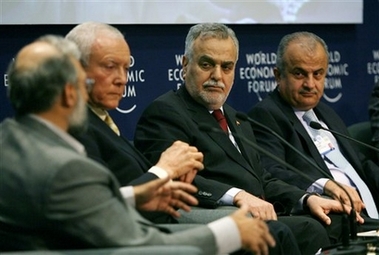Iran: Arabs should back nuclear program
SOUTHERN SHUNEH, Jordan - Iran urged Arab countries on Sunday to support its nuclear program but received a cool reception at the World Economic Forum, particularly from US allies worried about Iran's growing regional influence.
 From right, Jordanian Foreign Minister Abdul-Ilah Al-Khatib, Iraqi Vice President Tariq Al-Hashemi, US Republican Senator from Utah Orrin G. Hatch and Director of Institute for Studies in Theoretical Physics and Mathematics in Iran Mohammed Larijani take part in session during the third day of the World Economic Forum in South Shuneh, 35 Kilometers (21 Miles) west of Amman, Jordan, Sunday, May 20, 2007. [AP] |
Arab countries should value Iran's nuclear development because it could help them address their own energy needs, said Mohammed J.A. Larijani, a former deputy foreign minister and brother of Iran's chief nuclear negotiator.
"Iran will be a partner, a brotherly partner, and will share its capabilities with the people of the region," Larijani told AP Television News at the end of the three-day World Economic Forum in this dead sea resort town.
In contrast, he argued the West would turn a blind eye if Arab countries came looking for nuclear assistance.
Arab diplomats gave Larijani and other Iranian delegates a cold shoulder during the forum, however.
"There are serious flaws in the regional order and some countries are interfering in the affairs of Arab countries," Jordanian Foreign Minister Abdul-Ilah al-Khatib said, referring to Iran's growing influence in Iraq.
Addressing Larijani at a panel session on Iraq's future, al-Khatib said: "We need to see deeds on the ground and respect for Iraq's territorial integrity."
Suspicion of Iran was clear at the conference. Iranian delegates stood by themselves during coffee breaks at the gathering of some 1,000 politicians and businessmen from Arab and Western nations, including the United States.
Iranian Foreign Minister Manouchehr Mottaki often found himself defending Iran's policies, especially in Iraq, where Sunni Arabs worry Shiite Iran is aiding the flow of arms and fighters into the majority Shiite country.
Iraqi Vice President Tariq al-Hashemi, a Sunni Arab, lashed out at Iran at the conference.
"We say stop your interference in our internal affairs, stop settling scores on our soil, stop being part of covert plans to destabilize Iraq, and sit down with us to settle our differences, resolve outstanding issues and talk about economic cooperation," he said.
Iranian officials in Tehran, meanwhile, insisted the country had no intention of suspending uranium enrichment.
"I confirm that our technical efforts are going ahead appropriately," Reza Aqazadeh, the head of Iran's Atomic Energy Organization, said in comments to the official news agency, IRNA.
Aqazadeh said Iran's goal remained "improving nuclear technology" and installing 50,000 centrifuges at its underground plant in Natanz. A confidential IAEA document obtained by AP last month said Iran was using 1,300 centrifuges at Natanz.
In the enrichment process, uranium gas is injected into cascades of thousands of centrifuges, which spin and purify it. If enriched to a low level, the result is fuel for a nuclear reactor. To a much higher level it can build the material for a nuclear warhead.
The US and some of its allies have accused Iran of pursuing nuclear weapons; Iran says its program is peaceful.
Foreign Ministry spokesman Mohammad Ali Hosseini said Iran's top nuclear negotiator, Ali Larijani, had agreed to meet European Union foreign policy chief Javier Solana on May 31 to discuss the deadlock over Tehran's nuclear program.
The two men last held talks in April, and Larijani said at the time they had come closer to a "united view" on how to break the stalemate.
相关文章
- 欧美文化:Mexican president pushes lithium bill after energy reform setback
- 欧美文化:U.S. San Francisco mayor announces new programs to reduce carbon emissions
- 欧美文化:Trade show's comeback marks resilience of Lebanese economy amid crisis
- 欧美文化:Interview: West should abide by its commitments to solve Ukrainian conflict, says Pakistani exp
- 欧美文化:COVID cases back on rising as European countries relaxes pandemic restrictions
- 欧美文化:Iran seeks peaceful use of nuclear energy, says top leader
- 欧美文化:Biden should sympathize with Americans instead of boasting about progress in upcoming address:
- 欧美文化:Israeli PM, U.S. president hold phone talks on Iranian nuclear issue
- 欧美文化:Ukraine backs U.S. response to Russia's security guarantees: FM
- 欧美文化:EU ready to retaliate against Russian aggression should diplomacy fail: Borrell




 手机网站
手机网站